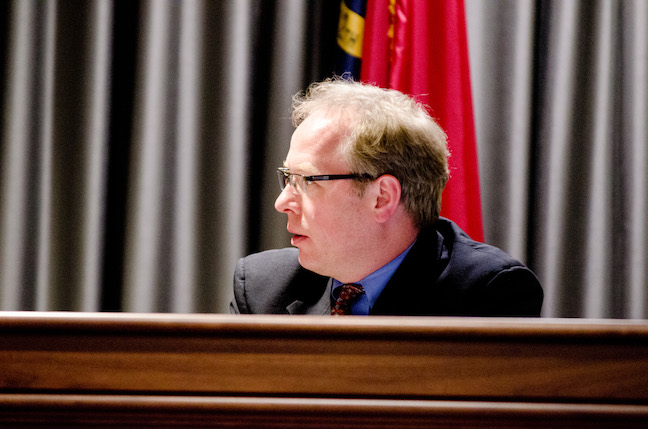File photo of Brownie Newman by Max Cooper
At their Dec. 3 meeting, the majority of Buncombe County Commissioners endorsed a goal of reducing the county’s carbon footprint by 80 percent. The plan calls for cutting its emissions by 2 percent each year until the final target is met.
Commissioner Brownie Newman argued that the measure will actually save the county money in the longterm, and is needed to help avoid the worst impacts of global warming. The plan represents “one of the most ambitious clean energy commitments adopted by any local governments in the country,” according to Newman.
The final resolution notes: “The American Association for the Advancement of Science has determined, ‘The scientific evidence is clear: global climate change caused by human activities is occurring now, and it is a growing threat to society.’”
However, Commissioners Mike Fryar and Joe Belcher, who cast the lone votes against the measure, objected to any mention of climate change. Fryar argued the language was too “political.” “If you want to take the politics out of it, I’m right there with you,” Fryar added. He and Belcher presented alternative language that didn’t note climate change or establish the 80 percent reduction goal. But their counter proposal failed to attract any support from other members of the board, with Newman arguing that their language “eliminates the longer term goal” and “eliminates the scientific basis for the policy in the first place.”
About 30 attendees at the meeting stood up in a show of support for Newman’s version, with several local environmental leaders urging approval.
The final measure authorizes county staff to make a number of specific changes to reduce emissions over the next five years, as recommended by a recent energy audit conduced by Shaw Environmental. They include making improvements to the county government’s heating systems, lights, water fixtures and more. The audit estimates that the initial steps will cost roughly $846,900 over the next five years. When the improvements are complete, they will result in an annual savings of about $173,500 in energy costs, according to the report.
The resolution did not immediately allocate any money towards the improvements, but “we’re definitely giving staff a green light” to fund them in the next budget, which will be drafted in the spring, noted board Chair David Gantt.
After five years, the county will still be a long way from reaching the ultimate goal of reducing carbon by 80 percent. And General Services Director Greg Israel noted that he’s unclear how the county will ever ultimately meet that mark. The resolution doesn’t outline any specific actions after five years. It does, however, require annual updates from staff on progress.
“The county has a moral example to be an inspiration, to set the bar high,” said Gantt. “You have to have a target to hit a bullseye. …We’ve got to be good stewards. We’ve got to deal with our energy future.”
Mountain Xpress will have more coverage of this issue in coming days.




While I think energy reduction is a good thing for everyone to consider and participate, do the commissioners realize a 2% reduction each year will take 80 years to reach a reduction of at least 80%?
I am always fearful when our elected officials start declaring numerical and statistical values as goals, because often they are stating them incorrectly.